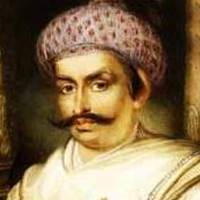Profile of Asifud Daula
Pen Name : 'Asif'
Born :Faizabad, Uttar pradesh
Died : 21 Sep 1797 | Lucknow, Uttar pradesh
Relatives : Meer Soz (Mentor)
The fourth Nawab of Awadh, Asif ud Daula, was the founder of the Lucknow culture and a style of Urdu poetry, which later came to be known as Dabistan-e-Lucknow. Faizabad was the capital of Awadh in his time and Lucknow was nothing more than a small town. After the death of Shuja Ud-Daula in 1775, Asif al-Dawla ascended the throne. He took steps to give Lucknow a separate political and cultural identity from Delhi. In the time of Asif ud Daula, Delhi was politically and economically bad. He welcomed the artists living in Lucknow from there and even sent for them by offering travel expenses.
Asif ud Daula’s real name was Muhammad Yahya Mirza Zamani. He was born in 1748. His education and training were arranged like that of a prince. He also mastered Urdu and Persian with good skills in other arts. He was a man of taste and was fond of poetry. Apart from Urdu, he also compiled a Persian Diwan. After the death of his father, he His father Shuja al-Dawla had to pay a large sum of money to the British as a ransom after the Battle of Buxar. At that time, his mother had shown great self-sacrifice and handed over the ornaments of her body to her husband. After the death of his father, when Asif ud Daula asked for his inheritance, his mother refused to give it. Asif ud Daula 's mother's temperament was arrogant and rude and Asif ud Daula did not like to be subject to anyone. So, he moved capital to Lucknow. Arriving in Lucknow, he first focused on the construction of the city. And day and night new buildings began to be erected in Lucknow. The pace of construction was accelerated by the famine that spread during that period, as the construction work became a relief work that provided employment for thousands of people.
As far as the affairs of the empire are concerned, at the political and military level, the British had his hands tied under an agreement. Nevertheless, he never spoke to the British in a subdued or submissive manner, and his relations with them were friendly. He wanted to make his empire ideal in all respects and he did not like to be influenced by anyone in any way. In order to avoid the conspiracies of the palace and to establish cordial relations with the people, he gave posts in ministries to the lower castes. So that he would not be involved in any conspiracy or insurgency under his auspices. His main minister was either a Shia or a Hindu. The result of this strategy was that a mixed Hindu-Muslim civilization took root in Awadh. Seeing the large majority of Hindus in the state, he tried his best to win the hearts of the people. Large scale temples were built during his reign. Raja Takit Rai was his Minister of Finance, who built many ponds and temples. The famous Jagannath Temple in Lucknow was also built during the reign of Asif Al-Dawla for which the Nawab gave land. He had great respect for Hindu saints and faqirs. Baba Kalyan Gari left Haridwar and came to Lucknow during his era.
Thanks to Asif ud Daula, Lucknow, Delhi and Agra became a tourist destination for archeological and architectural enthusiasts. The buildings he built, the Khusa Rumi Darwaza and the Imam Bara are an unmistakable example of architecture that people still admire today.
He made Mirza Soz his Ustad in poetry. The new Urdu language building was built on the cultural autonomy that Asif ud Daula laid the foundation for. Urdu poetry moved from the mourning and sympathy to joy and color which eventually took the form of Dabistan-e-Lucknow. Until his time, Urdu poetry was mainly ghazal or qasida poetry. During his time, special attention was paid to Masnavi and Marsiya, which produced incomparable elegy-reciters like Anis and Dabir. Asif ud Daula was a generous and giving ruler, admirer and patron of the arts, architect of great buildings and is remembered as the pioneer of the Ganga-Jamni civilization.

